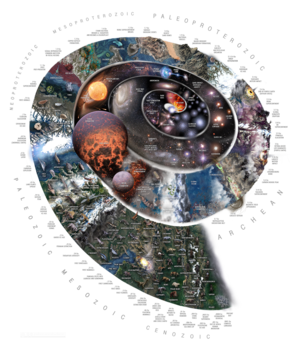Temps profund

Temps profund, en anglès: Deep time, és un concepte de l'escala geològica del temps. Va ser desenvolupada pel geòleg James Hutton (1726–1797). La ciència moderna actualment considera que l'edat del planeta Terra és d'uns 4,54 milers de milions d'anys.
Concepte científic
Hutton basava el seu punt de vista sobre la forma com s'havia desenvolupat la geoquímica a Escòcia i Escandinàvia des de la dècada de 150 i més enllà.[1] Hutton va ser ajudat pel matemàtic John Playfair
Els primers geòlegs com Nicolas Steno i Horace-Bénédict de Saussure havien desenvolupat idees sobre estrats geològics que es formen a partir de l'aigua mitjançant processos químics, i que Abraham Gottlob Werner (1749–1817) va desenvolupar en una teoria coneguda com a Neptunisme. La teoria innovadora de Hutton de l'any 1785 es coneix com la del Plutonisme, visualitzada com un procés interminable de formació de roques, aixecament i erosió. Hutton va afirmar: "no trobem cap vestigi d'un inici ni esperem cap final".[2][3]
Charles Lyell en els seus Principles of Geology (1830–1833) desenvolupà l'enfocament de Hutton d'un «temps profund» sense fi com a concepte científic crucial dins el seu uniformitarianisme. Charles Darwin va estudiar el llibre de Lyell durant el segon viatge del HMS Beagle, abans de començar a desenvolupar la teoria de l'evolució
Conceptes similars al de temps geològic es poden trobar al segle xi en l'obra del persa Avicenna (Ibn Sina, 973–1037),[4] i a la Xina en Shen Kuo (1031–1095).[5]
El teòleg catòlic Thomas Berry (1914–2009) explorà les implicacions espirituals del “temps profund” i això ha influït en l'ecologia profunda i l'ecofilosofia
Notes
- ↑ Eddy, Matthew Daniel. The Language of Mineralogy: John Walker, Chemistry and the Edinburgh Medical School 1750-1800. Londres: Ashgate, 2008, p. Ch. 5.
- ↑ Montgomery, 2003.
- ↑ Rance, 1999.
- ↑ Toulmin i Goodfield, 1965, p. 64.
- ↑ Sivin, 1995, p. iii,23-24.
Referències
- Web
- Campbell, Anthony. «Book review: In Search of Deep Time», 2001. Arxivat de l'original el 2007-01-02. [Consulta: 26 novembre 2015].
- Darwin, C. R. «Darwin Correspondence Project - Letter 101 — Darwin, C. R. to Fox, W. D., (9 July 1831)», 09-07-1831.
- Korthof, Gert. «A Revolution in Palaeontology: Review of Henry Gee's In Search of Deep Time», 2000.
- Montgomery, Keith. «Siccar Point and Teaching the History of Geology» (pdf). University of Wisconsin, 2003. [Consulta: 26 març 2008].
- Palmer, A. R.; Zen, E-an «The Context of Humanity: Understanding Deep Time». Geological Society of America. Critical Issues Committee.
- Rance, Hugh. «Hutton's unconformities» (pdf). Historical Geology: The Present is the Key to the Past. QCC Press, 1999. Arxivat de l'original el 2008-12-03. [Consulta: 20 octubre 2008].
- Books
- McPhee, John. «Basin and Range». A: Annals of the Former World, 1998, p. 77. ISBN 0-374-10520-0.
- Repcheck, Jack. «Chapters 2 and 5». A: The Man Who Found Time: James Hutton and the Discovery of the Earth's Antiquity. Cambridge: Perseus Books, 2003. ISBN 0-7382-0692-X.
- Rossi, Paolo (1984). The Dark Abyss of Time: The History of the Earth and the History of Nations from Hooke to Vico, tr. by Lydia Cochrane, Chicago: University of Chicago Press, pp. 338, ISBN 0226728358.
- Sivin, Nathan. Science in Ancient China: Researches and Reflections. Brookfield, Vermont: Ashgate Publishing Variorum series, 1995, p. III, 23–24.
- Toulmin, Stephen; Goodfield, June. The Ancestry of Science: The Discovery of Time. University of Chicago Press, 1965, p. 64.
- White, Andrew Dickson. A History of the Warfare of Science with Theology in Christendom. New York: D. Appleton & Company, 1896.
- Winchester, Simon. «Chapter 2». A: The Map That Changed the World: William Smith and the Birth of Modern Geology. New York: HarperCollins, 2001. ISBN 0-06-019361-1.
- Journals
- Ialenti, Vincent «Adjudicating Deep Time: Revisiting The United States' High-Level Nuclear Waste Repository Project At Yucca Mountain». Science & Technology Studies, 27, 2.
- Kubicek, Robert «Ages in Chaos: James Hutton and the Discovery of Deep Time». The Historian, 70, 1, 01-03-2008, pàg. 142–143.
- Playfair, John «Hutton's Unconformity». Transactions of the Royal Society of Edinburgh, V, III, 1805.
Enllaços externs
- ChronoZoom Arxivat 2012-03-22 a Wayback Machine. is a timeline for Big History being developed for the International Big History Association by Microsoft Research and University of California, Berkeley
- Deep Time in Evolution (TV series). Note: this PBS/WGBH website advises “shockwave required.”
- Deep Time - A History of the Earth : Interactive Infographic
- "Embracing 'Deep Time' Thinking" (Vincent Ialenti) NPR Cosmos & Culture.
- "Pondering 'Deep Time' Could Inspire New Ways To View Climate Change" (Vincent Ialenti) NPR Cosmos & Culture.
